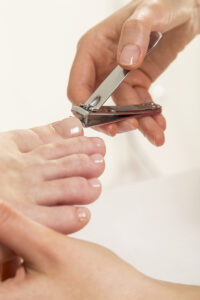Podiatrist in Plano, TX: Watch Out for Ingrown Toenails
 Ingrown toenails can be extremely painful, unsightly, and even become infected if left untreated. You may be in pain or embarrassed by the appearance of an ingrown toenail. However, there are treatments available for this condition, so you don’t have to hide your feet or suffer in pain! Our podiatrist in Plano, TX, explains more about ingrown toenails here.
Ingrown toenails can be extremely painful, unsightly, and even become infected if left untreated. You may be in pain or embarrassed by the appearance of an ingrown toenail. However, there are treatments available for this condition, so you don’t have to hide your feet or suffer in pain! Our podiatrist in Plano, TX, explains more about ingrown toenails here.
Early Treatment
Some ingrown toenails are mild enough to treat at home, but there are cases of severe ingrown toenails as well. This is a problem for individuals with diabetes, since the ingrown toenail might not be noticed at first and lead to a serious infection. Keep an eye out for changes in your nails and come to our office at the first signs – we can help you get the best treatment possible to prevent complications and heal quickly.
Causes & Symptoms
There are a few causes of ingrown toenails, such as:
- Cutting your toenail too short
- Trauma, such as a stubbed toe, can also cause the nail to grow inward
- Rounding the edge of the nail
- Wearing ill-fitting shoes or socks
- Shoes that are too tight, pressing your nail into your toe
- Repeating an activity that injuries the nail, such as kicking a soccer ball
Pain from the nail growing into the skin instead of over it is the main symptom of an ingrown toenail. It may swell, become red, or drain pus if it becomes infected. Our podiatrist will perform an exam to diagnose an ingrown toenail and recommend proper treatment.
Treatments & Complications
It’s possible to heal mild cases with conservative, at-home treatments. Try these steps to relieve pain and help the nail to grow out:
- Soak the affected toe in warm water 2 – 3 times daily.
- If you develop pus, do not use a needle to drain it. This will make the infection worse.
- Put a small piece of wet cotton ball under the corner of your ingrown nail to lift the nail off the skin.
- Soak your toe and change the piece of cotton daily.
- Do not dig under your nail with sharp objects – this can cause infection.
While your ingrown toenail is healing, wear comfortable shoes or sandals that do not press on your toe. If you have any further problems or the toenail doesn’t heal on its own, contact our podiatrist immediately. It’s critical to treat this condition to avoid infection or other foot problems.
Contact Our Podiatrist in Plano, TX, Today To Learn More!
The information provided in this article is not meant to be medical advice and is for educational purposes only. If you would like to learn more about hammertoe and other topics related to podiatry, feel free to contact Dallas Podiatry Works, with a convenient podiatry office in Plano, TX, by calling 972.564.8556 or by clicking here.

 Ingrown toenails can be extremely painful, unsightly, and even become infected if left untreated. You may be in pain or embarrassed by the appearance of an ingrown toenail. However, there are treatments available for this condition, so you don’t have to hide your feet or suffer in pain! Our podiatrist in Plano, TX, explains more about ingrown toenails here.
Ingrown toenails can be extremely painful, unsightly, and even become infected if left untreated. You may be in pain or embarrassed by the appearance of an ingrown toenail. However, there are treatments available for this condition, so you don’t have to hide your feet or suffer in pain! Our podiatrist in Plano, TX, explains more about ingrown toenails here. 


